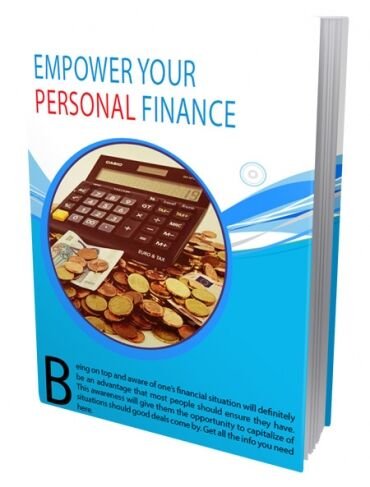
Empower Your Personal Finance: Strategies for Financial Well-Being
Introduction to Personal Finance Empowerment
Personal finance empowerment is a critical component of achieving overall financial well-being. By taking control of your personal finance, you can significantly reduce stress, increase your savings, and work towards achieving your financial goals. Learning to manage your money effectively is not just about accumulating wealth, but also about making informed decisions that can lead to a more secure and fulfilling life.
Empowering yourself in the realm of personal finance begins with understanding the importance of financial literacy. It involves educating yourself about budgeting, saving, investing, and smart planning. With this knowledge, you become equipped to make decisions that align with your long-term objectives. Whether it’s saving for a major purchase, planning for retirement, or simply ensuring you have a safety net for emergencies, being financially empowered puts you in the driver’s seat of your financial future.
Moreover, taking control of your finances can lead to enhanced mental and emotional well-being. Financial stress is a common burden that many face, but by establishing a solid financial plan, you create a sense of security and peace of mind. Knowing that you have a strategic approach to managing your money allows you to focus on other important aspects of your life without the constant worry about financial instability.
In essence, personal finance empowerment is about making your money work for you, rather than being a source of worry and anxiety. It’s about setting and reaching financial goals through disciplined saving, judicious spending, and informed investing. As you embark on this journey, remember that the first step towards financial empowerment is the most crucial. It’s about recognizing the need for change, committing to learning, and taking actionable steps towards a better financial future. Let this be your motivation to start making positive changes today and empower yourself to achieve financial well-being.

Understanding Your Financial Situation
Assessing your current financial situation is the cornerstone of effective personal finance management. To empower yourself financially, start by comprehensively tracking your income and expenses. This involves documenting all sources of income, such as salaries, freelance work, or passive earnings, and meticulously recording your expenditures, ranging from essential bills to discretionary spending. Utilizing tools like budgeting apps or spreadsheets can simplify this process and provide you with a clear overview of where your money goes each month.
Understanding your net worth is another critical aspect. Your net worth is calculated by subtracting your total liabilities (debts) from your total assets (savings, investments, property, etc.). This figure provides a snapshot of your overall financial health. Regularly updating this figure allows you to monitor your progress towards financial goals and make necessary adjustments. Identifying areas where you can improve is crucial; for instance, high-interest debts can be targeted for early repayment, or you might discover opportunities to increase savings by cutting unnecessary expenses.
Having a clear picture of your financial standing empowers you to make informed decisions. It lays the groundwork for smart financial planning, enabling you to set realistic and achievable goals. By understanding where you currently stand, you can create a tailored strategy that includes savings plans, investment opportunities, and debt management solutions. This proactive approach not only enhances your financial well-being but also equips you with the knowledge to navigate future financial challenges with confidence.
In essence, understanding your financial situation is a dynamic process that requires regular review and adjustment. By diligently tracking your income and expenses, calculating your net worth, and identifying areas for improvement, you are building a solid foundation for a prosperous financial future. This foundational step is crucial as it empowers you to make strategic decisions that align with your long-term financial goals, ensuring that you are well-prepared to achieve financial stability and success.
Setting Realistic Financial Goals
Setting realistic financial goals is a crucial step in empowering your personal finance journey. The SMART framework—Specific, Measurable, Achievable, Relevant, and Time-bound—offers a structured approach to goal-setting, ensuring that your ambitions are both attainable and strategically planned.
Short-term financial goals typically span a few months to a year and might include objectives such as building an emergency fund or paying off high-interest debt. For instance, committing to save $1,000 over six months for unexpected expenses is a specific and measurable goal. By breaking this down into monthly or even weekly saving targets, you make the goal more achievable and less daunting.
Medium-term goals often cover a period of one to five years. Saving for a down payment on a house or planning for an extensive vacation falls into this category. Suppose you aim to save $20,000 over three years for a house down payment. By setting smaller, annual savings milestones, you can track your progress and make adjustments as needed, ensuring the goal remains relevant to your financial situation.
Long-term goals extend beyond five years and include significant life events such as retirement planning or funding your child’s education. For example, planning to save $500,000 for retirement over 30 years might seem overwhelming, but breaking it down into yearly or monthly saving targets can make it more manageable. Regularly reviewing and adjusting these goals can keep you motivated and on track.
To stay motivated, visualize the benefits of achieving your goals. Create a vision board or use financial apps that provide visual representation of your progress. Additionally, celebrate small milestones along the way to maintain enthusiasm and commitment. Tracking progress through regular reviews ensures that you remain focused and can adapt your strategies as needed.
Incorporating these strategies into your financial planning can empower you to achieve your money-saving goals, paving the way for a more secure and prosperous future. By adhering to the SMART criteria, you enhance the likelihood of success and foster a disciplined approach to personal finance management.

Creating a Budget That Works for You
Effective personal finance management begins with a solid budget. Creating a budget that aligns with your financial goals and lifestyle is essential for achieving financial well-being. There are various budgeting methods to consider, each offering unique advantages to help you manage your money more effectively.
One popular method is the 50/30/20 rule. This approach divides your after-tax income into three categories: 50% for needs, such as housing and groceries; 30% for wants, like dining out and entertainment; and 20% for savings and debt repayment. This method is straightforward and helps you prioritize essential expenses while still allowing room for discretionary spending and savings.
Another effective strategy is zero-based budgeting. With this method, every dollar of your income is allocated to a specific expense, savings, or debt repayment category, ensuring that your income minus your expenditures equals zero. This technique requires detailed tracking of expenses but can be particularly empowering for those aiming to maximize their financial efficiency.
Envelope budgeting is yet another approach, which involves allocating cash for different spending categories and placing it in envelopes. Once the cash in an envelope is depleted, you cannot spend any more in that category until the next budgeting period. This method can be particularly beneficial for those who prefer a tangible way to control their spending and avoid overspending.
Sticking to a budget can be challenging, but it is crucial for achieving your financial goals. One tip is to regularly review and adjust your budget to reflect changes in income or expenses. Life is dynamic, and your financial plan should be flexible enough to accommodate unexpected events or shifts in priorities. Additionally, tracking your spending habits and using budgeting apps can provide insights and help you stay accountable.
Incorporating these budgeting methods and tips into your personal finance strategy can empower you to take control of your money, make informed financial decisions, and work towards achieving your financial goals with confidence and precision.
(Additional eBooks are Available in the Freedom Funds Hub Shop)
Building and Maintaining an Emergency Fund
Establishing an emergency fund is a fundamental step in empowering your personal finance and ensuring financial stability. An emergency fund acts as a safety net, protecting you from unforeseen expenses that could otherwise derail your financial goals. Understanding how much to save is crucial. Financial experts typically recommend setting aside three to six months’ worth of living expenses. This range provides a buffer to cover unexpected costs such as medical emergencies, car repairs, or sudden job loss.
When determining where to keep your emergency fund, accessibility and liquidity are key factors. High-yield savings accounts, money market accounts, or other low-risk, easily accessible savings vehicles are ideal options. These accounts offer modest interest rates while ensuring quick access to your funds when needed. It’s essential to keep this money separate from your primary checking account to avoid the temptation of using it for non-emergencies.
Prioritizing the creation of an emergency fund can be challenging, especially on a tight budget. Start by setting small, achievable savings goals. Automate transfers from your checking account to your emergency fund to ensure consistent contributions. Additionally, review your budget for non-essential expenses that can be reduced or eliminated temporarily to boost your savings efforts. Remember, every small contribution adds up over time, bringing you closer to your financial safety net.
Knowing when and how to use your emergency fund is as important as building it. Reserve these funds strictly for genuine emergencies – those unforeseen and unavoidable expenses. Avoid dipping into this fund for discretionary spending or planned expenses. Once you utilize the emergency fund, it’s imperative to replenish it promptly. Resume your automated transfers and consider diverting any windfalls, such as tax refunds or bonuses, to rebuild your savings quickly.
By strategically planning and maintaining an emergency fund, you empower your financial well-being, providing a cushion that allows you to navigate life’s uncertainties with confidence. This proactive approach not only safeguards your financial health but also contributes significantly to achieving your broader financial goals.

Strategies for Reducing Debt
Effective debt management is crucial for achieving financial well-being. One widely recommended approach is to employ structured repayment strategies, such as the snowball and avalanche methods. The snowball method involves paying off the smallest debts first, which can motivate you by providing quick wins and a sense of accomplishment. Conversely, the avalanche method focuses on paying off debts with the highest interest rates first, thereby minimizing the amount paid in interest over time. Both methods have their merits, and choosing the right one depends on your personal finance goals and psychological preferences.
Negotiating with creditors is another potent strategy for reducing debt. Many creditors are willing to negotiate terms, especially if you’re facing financial hardship. This could involve lowering interest rates, extending payment periods, or even reducing the principal amount owed. It is important to approach these negotiations confidently and be prepared to present your financial situation clearly.
Debt consolidation can also be a viable option. This involves combining multiple debts into a single loan, often with a lower interest rate. Debt consolidation simplifies the repayment process and can reduce the overall monthly payment, making it easier to manage your finances. However, it is essential to ensure that the terms of the new loan are favorable and genuinely beneficial in the long run.
Prioritizing high-interest debt is vital for any debt reduction plan. High-interest debts, such as credit card balances, can quickly grow if not addressed promptly. By focusing on these first, you can save a significant amount of money in interest payments over time.
Creating a debt repayment plan and sticking to it is fundamental to achieving financial freedom. This plan should outline your debts, interest rates, and a timeline for repayment. Regularly reviewing and adjusting this plan as needed will help you stay on track and make informed decisions about your finances. By adopting these strategies, you can empower your personal finance journey and work towards a debt-free future.
Investing for Your Future
Investing is a crucial component of personal finance that empowers individuals to achieve their long-term financial goals. By allocating funds into various types of investments, individuals can grow their wealth over time, thereby ensuring a more secure financial future. Understanding the different types of investments and their respective benefits and risks is essential for making informed decisions.
One of the most common types of investments is stocks. When you purchase stocks, you are buying a share of ownership in a company. Stocks have the potential for high returns, but they also come with higher risks. Bonds, on the other hand, are considered safer investments. By purchasing bonds, you are essentially lending money to a company or government in exchange for periodic interest payments and the return of the bond’s face value at maturity.

Mutual funds offer a more diversified approach by pooling money from multiple investors to purchase a variety of stocks, bonds, or other securities. This diversification helps to spread risk, making mutual funds a popular choice for those looking to balance potential returns with risk management. Real estate is another investment option that involves purchasing property to generate rental income or capital appreciation over time. While it can require a significant initial investment, real estate often provides steady, long-term returns.
Diversification is a key principle in smart investing. By spreading investments across different asset classes, investors can mitigate risks and potentially achieve more stable returns. Understanding your risk tolerance is also critical. Risk tolerance refers to your ability and willingness to endure market volatility. Younger investors may have a higher risk tolerance because they have more time to recover from potential losses, whereas older investors may prefer more conservative investment options.
Starting to invest early is one of the most effective strategies for building wealth. The power of compound interest allows your investments to grow exponentially over time, making early investing a significant advantage. To further empower your personal finance journey, consider seeking professional advice or utilizing resources such as financial planners, investment courses, and online tools to deepen your understanding of investing principles.
(Additional eBooks are Available in the Freedom Funds Hub Shop)
Continuing Education and Staying Informed
In the dynamic realm of personal finance, staying informed and continually educating oneself is paramount. Financial landscapes evolve, regulations change, and new investment opportunities arise. To empower your financial journey and ensure long-term success, it’s essential to be proactive in seeking knowledge and adapting your strategies.
One effective way to stay educated is by immersing yourself in a variety of financial resources. Books such as “Rich Dad Poor Dad” by Robert Kiyosaki and “The Total Money Makeover” by Dave Ramsey offer valuable insights into money management and financial planning. For those who prefer auditory learning, podcasts like “The Dave Ramsey Show” and “ChooseFI” provide practical advice and real-life examples of financial success stories.
Online courses also offer a structured path to enhance your financial acumen. Platforms like Coursera, Udemy, and Khan Academy provide courses ranging from basic money management to advanced investment strategies. These courses allow you to learn at your own pace and focus on areas most relevant to your financial goals.
Engaging with a financial advisor can also be a significant asset. A qualified advisor can offer personalized advice tailored to your unique financial situation, helping you navigate complex decisions and optimize your financial planning. They can also keep you informed about new financial products and strategies that align with your saving goals.
Lastly, staying updated with current financial news is crucial. Websites such as Investopedia, Bloomberg, and CNBC provide up-to-date information on market trends, economic changes, and financial regulations. Subscribing to newsletters from these sites can ensure you receive the latest news directly in your inbox, allowing you to make informed decisions swiftly.
In sum, the key to maintaining financial well-being is continuous learning and staying informed. By leveraging diverse resources and adapting your strategies, you can make smart, informed decisions, and stay empowered on your journey towards financial success.
🎉 $100 Gift Card Giveaway from Freedom Funds Hub Inc! 🎉
Exciting news! With each purchase from the Freedom Funds Hub Shop, you’ll automatically be entered into our $100 Gift Card Drawing. Yes, every purchase gives you a chance to win!
Whether you’re investing in our financial eBooks, budgeting tools, or any of our top-notch financial products, you could be the lucky winner. The contest ends on September 2, 2024, and the drawing will take place on September 3, 2024.
The winner will be contacted via the email used at the time of purchase, so ensure your details are up to date. Don’t miss this opportunity to score a $100 Freedom Funds Hub Gift Card—shop now and win!